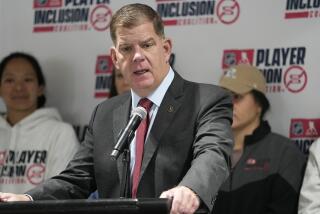THE NHL : Start of Talks on New Contract Leave Chill
- Share via
The word from New York was ominous.
“I’m scared, really scared now,” one club official said.
Understandably.
After months of operating without a new collective bargaining agreement and weeks of plotting strategy, representatives of the NHL owners and players sat down face to face Monday.
And promptly wound up back to back.
The talks broke off after only one day with no new negotiating sessions scheduled.
As bad as that sounds, it is even worse, considering the line drawn by the players a week ago.
The Players Assn. went public last week with the news that 21 of the 22 clubs had given its executive director, Bob Goodenow, authorization to call a strike.
At first, a strike date of March 16 was given. Now, that doesn’t appear so firm. Some are speculating it could be any time from next Monday to the end of the regular season, April 5. Others believe a strike might not be called until the start of the playoffs.
Although he has the legal power to pull the players off the ice, Goodenow apparently will not do so without revisiting each of the clubs and receiving a final, firm strike vote.
But one thing seems certain: Unless talks resume in the next week or two and some progress is made, there will be a strike.
The players guaranteed that by going public with their authorization vote. Failure to strike now would show a weakness that could destroy Goodenow’s effectiveness and, perhaps, the union itself.
The refusal of the owners to seriously discuss the issues, at least in the players’ minds, is tantamount to an opponent dropping his gloves on the ice.
And what does any hockey player do in such a situation?
He drops his own gloves, of course, and fights.
But this fight will cost more than five minutes in the penalty box. It could cost the loyalty of fans.
Wayne Gretzky walking a picket line is hardly going to elicit an outpouring of support, especially in the midst of a recession.
“It could hurt the image of the game,” conceded Gretzky of a possible strike. “It’s not good for anyone. The economy is not good now. People are not going to be thrilled with it.
“It’s going to be tougher in Canada, where hockey is it. It’s the bread and butter, the only entertainment they have.”
THE ISSUES
The sticking points that caused the talks to break off Monday were compensation and the size of the draft.
The players would like to see the draft cut from 12 rounds to six, allowing more players freedom to choose their places of employment.
And the players would like to see the rules for compensation relaxed as part of an overhaul of the free-agent system.
They are still upset by the awarding of defenseman Scott Stevens to the New Jersey Devils at the start of this season as compensation for the St. Louis Blues’ signing of wing Brendan Shanahan.
Such stiff compensation awards, the players say, severely limit player movement and discourage clubs from signing free agents.
There are other issues, such as the pension plan, the arbitration system and postseason revenue for the players.
For the owners, there is only one issue: money.
Their position is that salaries have risen dramatically during the last two years, and that players ought to be grateful considering that the league has no U.S. network television contract.
Although the owners say they are willing to discuss the other issues, they are not about to drastically alter the overall system.
THE FUTURE
The players are operating under the assumption that they will go on strike after they have received their final paycheck of the season late this month.
Because the owners make their big money in the playoffs, they will be left with big losses.
King owner Bruce McNall says, however, that the contracts cover preseason, regular-season and postseason play. If the players fail to show up for the playoffs, McNall said, “I’m looking for a refund.”
According to King player representative Marty McSorley, there still is room for maneuvering.
“The playoffs are not here yet, and nobody’s lost any money,” he said. “We’ve left some time before the playoffs.”
For what?
Assume that the players strike on March 16, or even March 23. And assume that the strike drags on for a few weeks. What then?
At least when baseball and football had strikes, they were ended far enough in advance of the playoffs to set up some ground rules for determining division winners. It certainly wasn’t ideal, but at least fans had time to adjust to the rules of a shortened season.
In this case, the season would simply end abruptly. Would those clubs in playoff positions automatically get them?
That would leave some unhappy teams and fans out in the cold.
One alternative would be to extend the season.
But that would not be so simple. Arenas have other events booked, especially those used for the NBA playoffs.
Besides, does anybody really want to wait until the Fourth of July to crown a Stanley Cup winner?
“They haven’t thought this out real well,” one team official said of the players.
That can be said of both sides.
More to Read
Go beyond the scoreboard
Get the latest on L.A.'s teams in the daily Sports Report newsletter.
You may occasionally receive promotional content from the Los Angeles Times.






